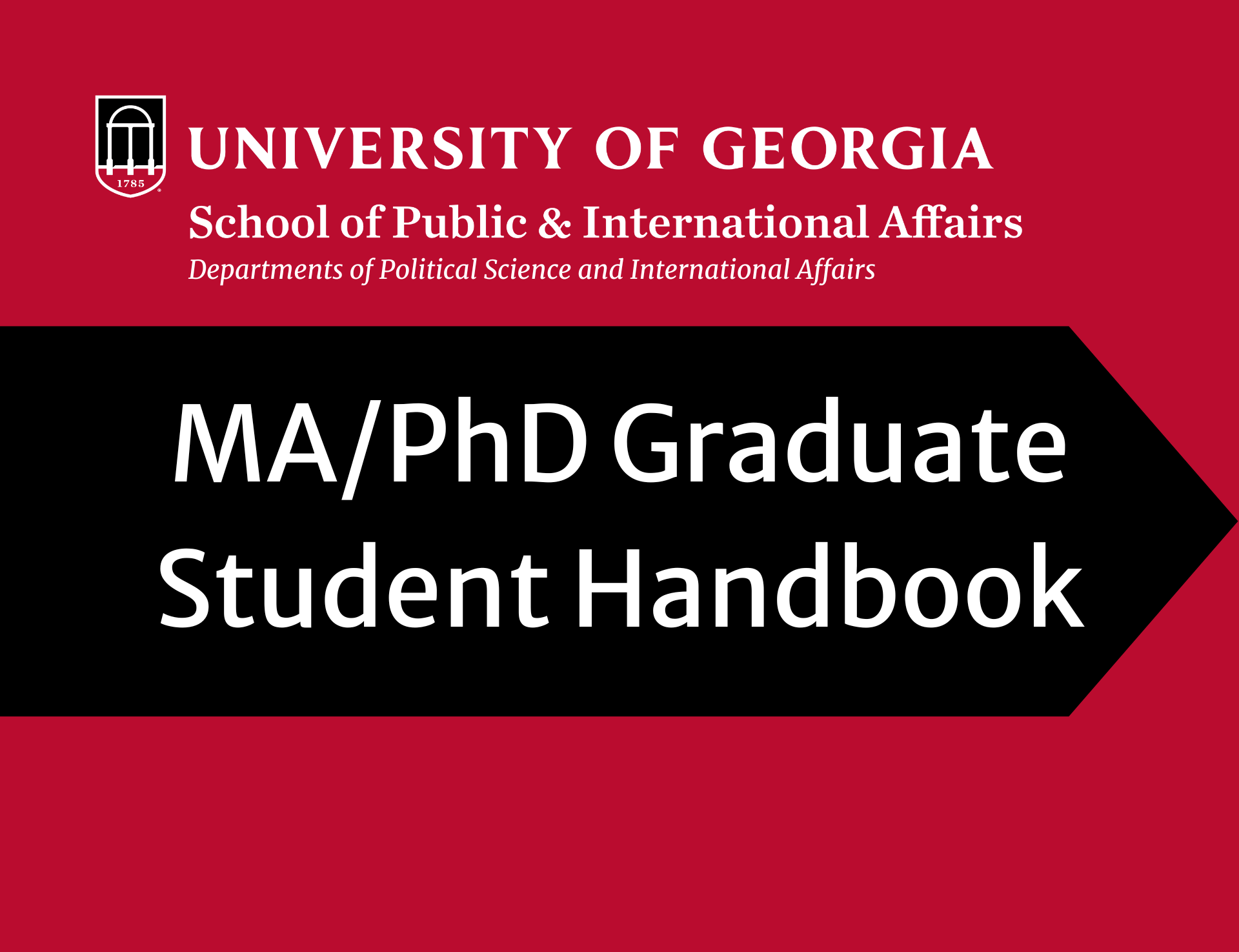Who to Contact
Dr. Megan Callaghan is the first point of contact for all general questions related to the MA, PhD, and MIP programs. She can answer questions about applications, funding opportunities, deadlines, faculty specialties, and other administrative issues. Due to the high volume of emails the Graduate Office receives, please review all the information on this page before submitting questions.
Dr. Geoffrey Sheagley is the graduate coordinator for American Politics and Political Theory & Philosophy. His grad office is Baldwin Hall 305E and he can be reached via email at [email protected] or phone at 706-542-4252.
Dr. Shane Singh is the graduate coordinator for International Relations and Comparative Politics.
Please do not send CVs, transcripts, or other materials for review prior to applying, as we cannot conduct preliminary material review. Please do not contact individual faculty members with questions about applications; refer all questions to Dr. Callaghan at [email protected].
Admission Deadlines
Our graduate programs admit for fall semester only. Please do not submit an application for spring or summer terms.
We do not prescreen applications, and you do not need to send a CV or other materials prior to submitting your application. You do not need to have identified a faculty mentor to apply. Please do not send application materials directly to faculty.
Applications must be complete and ready for review in the Departmental Graduate Office by February 15th of the year for which you are applying.
FALL 2024 DEADLINES
December 1st: Priority deadline for those wishing to receive priority consideration for graduate assistantships. A brief grace period is available for letters of reference and GRE scores. The online application must be submitted by December 1.
February 15: Application deadline for ALL Fall 2024 admissions.
Please read and follow these instructions carefully to avoid delay in our handling of your application. Both the Graduate School and the Department handle each application, and it hinders rather than expedites the process to send incorrect or unnecessary documents to either address.
For further information about graduate programs or for answers to questions about your application, please email the Graduate Program Administrator at [email protected].
Required Materials
You must submit all application materials through the UGA Graduate School’s online application portal. For detailed information, please see the Graduate School Admissions Requirements. You will need to provide the following:
1. Online Graduate School Application and fee ($75 domestic / $100 international). Please note that the Graduate School does not issue fee waivers based on financial need. Some applicants, such as McNair Scholars and veterans, may qualify for an application fee waiver: a full list of qualifying programs is here.
2. One unofficial transcript from each institution of higher education attended, except the University of Georgia. University of Georgia transcripts are on file. You may upload transcripts through the application portal or mail them directly to the UGA Graduate School.
3. Official GRE general test score report. The UGA institutional code for ETS reporting is 5813. No departmental code is required. The GRE is required for all* applicants and cannot be waived. We do not accept the LSAT, GMAT, or other standardized tests.
*UGA students applying to the MA from the Double Dawgs Pathway are not required to submit GRE scores.
4. Personal Objective Form
5. Statement of Purpose. This document should, in general, be between 1-3 pages long and should address what you wish to study in our MA program, why our program is a good fit for your research interests, and what your career aspirations are following the MA. The best statements avoid broad generalizations, speak in concrete detail, and attend to fit between your research interests and those of our faculty.
6. Curriculum Vitae (CV)
7. Three academic letters of recommendation.
Letters should be submitted through the online application. The strongest letters will come from faculty who have taught you and/or supervised your academic work and can speak to your work ethic, academic interests and ability, and ability to succeed in a master’s degree program. We strongly discourage submitting letters from elected officials and personal references such as clergy or friends.
8. Graduate Assistantship Application, if desired.
International applicants should consult the list of additional requirements. A list of country-specific requirements and waivers of English proficiency requirements may be found at the Graduate School’s website.
If you need to submit proof of English proficiency, you may submit one of the following:
TOEFL
The minimum TOEFL score for admission to the Graduate School at the University of Georgia is 80, with no subscore lower than 20. It is highly recommended that international applicants have a combined score of at least 90. A list of country-specific requirements and waivers of English proficiency may be found at the Graduate School’s website.
IELTS
The minimum IELTS score for admission to the Graduate School at the University of Georgia is 6.5 overall band score with no lower than 6.0 on any band. A list of country-specific requirements and waivers of English proficiency may be found at the Graduate School’s website.
Duolingo English Test
The Graduate School no longer accepts Duolingo English test scores for admission. You must submit a TOEFL or IELTS score.
Please upload all materials through the online application portal at gradapply.uga.edu. The departmental materials may be uploaded under the “Department-Specific” section. If you have difficulty uploading, departmental materials may also be emailed to [email protected].
For more information about the statement of purpose and letters of recommendation, see FAQs below.
Graduate Assistantships
The Graduate Program in Political Science and International Affairs is able to offer graduate assistantships to a very select number of qualified MA applicants. Graduate assistantships include a tuition waiver (students are expected to pay $25 in tuition per semester + student fees), stipend, partial health insurance subsidy, and a work commitment as either a teaching or research assistant. Due to budget limitations, assistantship funding at the MA level is extremely competitive.
You must apply for all assistantships through the Departmental Graduate Office. Do not contact the Graduate School about financial support. Most graduate assistantships come from departmental funding sources (SPIA assistantships). Students who receive support from the Graduate School must be nominated by their department and go through a competitive process.
To apply, fill out the Graduate Assistantship Application and submit with the rest of your program application. All applicants who submit an assistantship application will be considered for funding, although it is not common for MA students to be funded in their first year.
Applicants whose files are complete by December 1st are guaranteed consideration for the first round of awards. Students not receiving support during the first round are eligible in subsequent rounds if funding is still available. Awards follow the following timetable:
February
Exceptionally well-qualified applicants are nominated for a limited number of Graduate School assistantships
Early March
Winners of Graduate School assistantships are notified.
Mid-March
The first round of SPIA graduate assistantships is awarded to students.
Mid-April
If there are SPIA graduate assistantships available after the first round, a second round of offers is made.
May
Awarding of SPIA assistantships continues until all funds are exhausted.
Other Funding Opportunities
The University of Georgia has established partnerships with six minority-serving institutions participating in the Graduate School FUSE Program (Facilitating Underrepresented Student Experiences). Applicants from these schools (Albany State University, Florida A&M University, Fort Valley State University, Morehouse College, North Carolina A&T State University, and Spelman College) may be eligible for several benefits, including an application fee waiver and consideration for Graduate School assistantships. Consult their website for full details.
The Graduate School participates in the Yellow Ribbon program, which provides additional funds for tuition and fee expenses that exceed those covered by the Post-9/11 GI Bill. If you wish to be considered for this program, please email Lisa Sperling at [email protected]. Requests for the academic year must typically be made no later than the preceding March (e.g., March 2023 for the 2023-2024 academic year).
Program Requirements
The Master of Arts in Political Science and International Affairs is a two-year degree program. Students may choose to complete one of two program tracks:
1) MA-T (MA with Thesis): The MA-T program of study requires students to complete a minimum of 30 credit hours of coursework: 6 graduate seminars (18 credits), a three-course methodology sequence (9 credits), and 3 credits of master’s thesis work. A master’s thesis must be successfully defended to complete the degree. Please see the MA-T degree timetable for more detailed information.
2) MA-NT (MA, Nonthesis): The MA-NT program of study must contain a minimum of 33 hours of graduate coursework: 8 graduate seminars (21 credits) and a three-course methodology sequence (9 credits). In addition, students choosing the non-thesis option are required to complete an article-length seminar paper suitable for conference presentation under the guidance of a faculty major professor. Please see the MA-NT degree timetable for more detailed information.
A full description of MA requirements can be found in the Graduate Handbook.
Fields of Study
MA students have broad latitude in choosing courses and do not have to select a major or minor field, although most do identify with a field of study or department.
The departments of Political Science and International Affairs offer a variety of graduate courses in American Politics, Comparative Politics, International Relations, and Political Theory. Research methodology, particularly quantitative methods, is another strength of our program. You can see the list of current graduate courses and past course archives here.
Students with eclectic interests may, with the approval of the department’s Graduate Coordinator, work with the Graduate Program Administrator to identify extradepartmental courses that supplement their program of study. However, it is expected that the bulk of coursework will be within SPIA.
Graduate students may also be interested in pursuing a graduate certificate alongside the MA. UGA offers more than 50 such certificates, including African American Studies, African Studies, Cybersecurity, GIS, Nonprofit Leadership and Management, and Sustainability.
Double Dawgs
The Double Dawgs program was created to give ambitious and motivated University of Georgia students a competitive advantage in today’s knowledge economy. By earning both a bachelor’s degree and a master’s degree in five years, students can save time and money while positioning themselves for success after graduation.
UGA undergraduate majors in Political Science or International Affairs can pursue the MA-T or the MA-NT in Political Science & International Affairs. Students who wish to apply for either Pathway must first discuss their plans with their undergraduate academic advisor and create a full program of study plan for their undergraduate degree. Once that has been created, students should email the Graduate Program Administrator to schedule a meeting to discuss timelines and application procedures. Typically, this stage occurs in students’ second year of undergraduate study.
Typically, in year 3, students apply to the Double Dawgs Pathway. This is not the same as application to the graduate program; rather, it allows the student, if accepted, to begin taking graduate courses while continuing their undergraduate degree.
Double Dawgs Pathway students should plan to take the following four courses prior to applying for the MA:
- POLS 7012 (Pathway students are exempt from POLS 7010). This course is only offered in the fall.
- POLS 7014. This course is only offered in the spring.
- POLS 6100 (Preseminar in American Politics) OR INTL 6200 (Preseminar in International Relations) OR INTL 6300 (Comparative Analysis and Methods), depending on the student’s preferred course of study. POLS 6100 and INTL 6300 are only offered in the fall. POLS 6200 for MA students is only offered in the spring.
- One upper-level seminar course
Please note that students can count a maximum of 12 hours of graduate-level courses towards the undergraduate degree as well as the MA. There are no exceptions to this policy.
In year 4, students should begin working with the GPA to discuss formal application to the graduate program. This should include whether the student wishes to apply to the MA-T or the MA-NT. Students are not automatically granted entry to the MA program and must formally apply through the Graduate School. The DGS and Admissions Committee will review each application holistically on its individual merit.
Double Dawgs Pathway students are not required to submit GRE scores with their Graduate School applications.
In almost all cases, students should graduate with their undergraduate degree before matriculating into the MA as a full-time graduate student.
In year 5, eligible students who are admitted to the MA complete their graduate studies as a full-time graduate student (at least two courses per semester).
Double Dawgs Pathway students must take GRSC 7001 (GradFIRST Seminar) in the semester in which they matriculate to the MA. MA students take sections of GRSC 7001 offered by the Graduate School, which can be found on the GradFIRST website.
Placement
The majority of our MA students go on to pursue further study, either in a PhD program or law school. Our MA graduates have been accepted to PhD programs including those at Harvard University, Georgetown University, Emory University, Duke University, Penn State, and University of Kansas. Our MA students have also earned law degrees from law schools including Duke University, University of Virginia, and the University of Georgia Law School.
For those who are interested in pursuing a career directly after the MA, there are numerous options, particularly in the areas of data and policy analysis.
Students interested in pursuing federal careers after the MA should consult with the Graduate Program Administrator, Dr. Megan Morgan, who holds a Federal Advisor Certificate through the Partnership for Public Service and can help navigate the federal hiring process.
Recent placements include:
Liliana Yearns (MA, 2023), Case Management Assistant, Georgia Office of State Administrative Hearings
Zachary McDowell (MA, 2022), Digital Archive Manager, Oconee County Environmental Health Department
Evan Statile (MA, 2022), International Research Analyst, Virginia Economic Development Partnership
Elizabeth Farnum (MA, 2021), Senior Associate, Quadrant Strategies
Ross Schumacher (MA, 2021), Program Analyst, US Consumer Product Safety Commission
Austin Dobbs (MA, 2020), Emergency Preparedness Manager, UGA Institute for Disaster Management
Mitchell Redd (MA, 2020), Research Analyst, Georgia Judicial Council
Sam Driggers (BA/MA, 2020), Policy Analyst, Department of Defense
Lacey Ricks (MA, 2018), Counterparty Program Analyst, Invesco US
FAQs
If you have a question that is not answered below, please contact the Departmental Graduate Office at [email protected].
CHOOSING A PROGRAM
- How do I know whether to apply for the MA or the PhD?
The MA accepts applications from all applicants and is often a helpful introduction to graduate-level research and study prior to undertaking the PhD. The PhD accepts applications from applicants who have completed a master’s or professional degree (e.g., JD, MBA, MSW) as well as from highly qualified undergraduates who do not hold a graduate degree. If there is any concern about your preparation or readiness for doctoral study, the Graduate Committee may require you to complete the MA before applying to the PhD program.
- What’s the difference between the MA and the Master of International Policy (MIP)?
The MA in Political Science & International Affairs is primarily a research-focused degree. It requires multiple quantitative research methods courses and is designed principally to prepare those who intend on pursuing further study, typically in a PhD program. MA students have significant latitude in selecting their coursework, but these courses are generally advanced seminars designed to train students in the knowledge and skills needed to become a practicing political scientist, often within academia. Most of our MA students go on to earn a PhD or JD.
The Master of International Policy is a professional graduate program designed to prepare students to enter the policy career field immediately after completing the degree. Most MIP courses focus on applied, policy-oriented learning and skills in areas including nuclear nonproliferation, human security, and energy security. The MIP is ideal for students who are interested in pursuing careers in areas such as national security, international organizations, and consultancy. Most of our MIP students find jobs in the US federal or state governments, private consulting firms, and professional services.
- I love politics, but I’m bad at math. Can I still apply?
We do not require a prior background in math or statistics to apply to the MA program. However, you will be required to take our research methodology course sequence, which focuses heavily on quantitative methods. Students should be prepared to engage with research design, probability, statistical software, and calculus-based modeling.
APPLICATION REQUIREMENTS
- Are there minimum requirements for GPA, GRE, etc.?
Our program conducts holistic application review and considers the applicant’s entire application when considering offers of admission. As such, there are no minimum requirements set by the program. However, the Graduate School at the University of Georgia has the following minimum requirements:
GPA
The minimum undergraduate GPA standard for admission to the Graduate School at the University of Georgia for applicants who do not have a prior graduate degree is 3.0. Successful applicants to our program typically have GPAs ranging between 3.5-4.0.
GRE
The GRE is required and cannot be waived, but the Graduate School does not set a minimum score. Successful applicants to our program typically have combined GRE scores ranging from 300-330, with a quantitative percentile above the 50th.
TOEFL
The minimum TOEFL score for admission to the Graduate School at the University of Georgia is 80, with no subscore lower than 20. It is highly recommended that international applicants have a combined score of at least 90. Country-specific requirements and waivers for English proficiency may be found at the Graduate School website.
IELTS
The minimum IELTS score for admission to the Graduate School at the University of Georgia is 6.5 overall band score with no lower than 6.0 on any band. Country-specific requirements and waivers for English proficiency may be found at the Graduate School website.
Duolingo English Test
The Graduate School no longer accepts Duolingo English test scores for admission. You must submit a TOEFL or IELTS score.
- I am from a country where the primary language of instruction is English. Will you waive the GRE/TOEFL/IELTS?
The GRE is required of all applicants and cannot be waived, even if you are proficient in English, since it also provides important information on your quantitative preparation for graduate studies. The Graduate Program cannot waive language proficiency requirements such as TOEFL/IELTS scores. Please refer to the Graduate School’s country-specific requirements for information on whether you are required to submit TOEFL/IELTS English scores.
- What should I include in my statement of purpose?
We are most concerned with your academic background, intellectual interests and professional plans. Your SoP should address why you are interested in graduate study at UGA, what your academic interests are, and how you plan to use your graduate degree in your future career. Please do not include material that is not relevant to your academic background or interest. Please limit the SoP to 2-3 pages. Harvard, Cornell, and Stanford all provide helpful information on crafting the SoP.
- What kind of recommendation letters should I include in my application?
We require letters from professors who have taught you. Their letters should describe your academic work in detail so that the Graduate Committee can be assured that you can complete a rigorous graduate program. If you have done significant independent research, such as a thesis, the committee normally expects a letter from the professor who supervised that work. Letters from elected officials or “personal” references tend to be less valuable in determining your academic capability. Letters from work supervisors are of little value unless your job entailed research. In addition, letters from counselors, student affairs officers, and other non-faculty personnel on your campus generally provide little useful information for the committee. For those applicants who have been out of the academic setting for some time, getting letters from prior instructors can be difficult, but should be pursued nonetheless. In this instance, the committee will grant some flexibility, but once again, references must be able to address your academic and related abilities to some degree.
- If I have a strong application, am I automatically admitted?
No. Our graduate programs are small and selective to enable faculty to focus on building strong, supportive relationships with our graduate students. Our program receives many more applications each year than we have available places. Thus, admission is highly competitive and is based on holistic, comprehensive review of your application materials.
DECISIONS
- How are admissions decisions made?
The six-member Graduate Committee considers your entire application file: previous academic record, GRE scores, personal statement, CV, and recommendations. There are no “automatic” acceptance or refusal factors. The committee’s main concern is the likelihood that you will do well, not only in the graduate program you are applying for, but as a scholar and teacher once that degree is in hand. We also consider whether your interests are a good “fit” for the faculty, courses, and research centers available in the School of Public and International Affairs.
- When will I hear whether I’ve been accepted for admission?
The Graduate Committee aims to send out decisions for first-round applicants (i.e., those who submitted a complete application by December 1) in late January and early February. Applications submitted after December 1 but before our February 15 deadline will be considered on a rolling basis. Applications submitted after February 15, or applications that remain incomplete after February 15, will not be considered.
PROGRAM STRUCTURE
- Can I attend the program on a part-time basis?
Although our graduate programs are not designed for part-time students, it is possible for students to take less than a full course load (three courses per semester), thus extending their time in the program.
- Are graduate courses offered online or off campus?
All graduate courses are held on the UGA campus in Athens, GA. No online or distance learning options are available.
- Are classes offered in the evenings or on weekends for working professionals?
The graduate course schedule is not created for working students. Depending on the semester, there may be a course or two offered on a weekday evening, but this is not guaranteed. There are no courses offered on weekends.
- What is the cost of tuition?
As of Fall 2023, the current cost of graduate study per credit hour is $370 (in-state) and $1,050 (out-of-state). Student fees are currently assessed at $695 per semester. 9 credits (3 courses) is considered a full-time course load for graduate students. A full-time student would thus pay $4,439 (in-state) or $12,593 (out-of-state) per semester for a 12-credit load, not including fees. More information about current tuition rates can be found on the Bursar’s website.
Current Students
Current students should consult the MA/MIP/PhD Resource Hub on elc.uga.edu for access to important forms, policies, opportunities, and other information. The Graduate Handbook is another important resource. Students should refer to the version of the handbook active in the year in which they matriculated.









